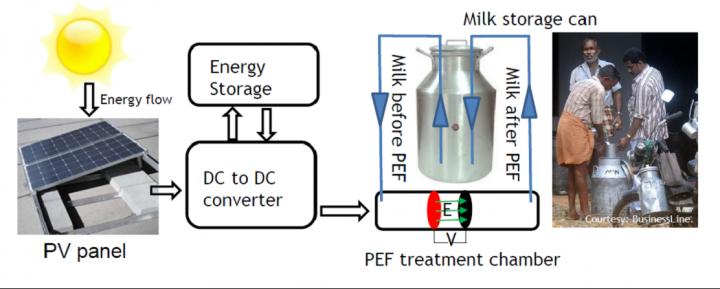Refrigeration and chemicals can manage pathogen growth but Listeria monocytogenes are less sensitive to low temperature; therefore, they can proliferate at refrigeration during transportation and storage. And not everyone has access to the infrastructure needed for a permanent electricity supply needed to drive refrigeration.
Perhaps if electricity were just needed in bursts.
Pulsed electric fields is an emerging technology in the food industry. It was shown in multiple studies to effectively kill multiple food born microorganisms and could provide an alternative, non-thermal pasteurization process.

Credit: Technology journal
"There is a constant search for new, low-cost, chemical-free technologies for milk preservation, especially for the small farmers in the low-income countries," says Alexander Golberg, PhD of Porter School at Tel Aviv University, the paper's author. "In many rural places refrigeration is not possible and its alternative, lactoperoxidaze system may be misused to disguise milk produced under poor hygienic conditions as Codex Alimentarius. This development not only holds great promise for unraveling many aspects of the complex wound healing process but can also potentially lead to new therapies. We believe that this model will enable other laboratories to learn and uncover new aspects of adult tissue growth and development."
"In the storage application, developed in this work, we use the fundamentally different approach for microorganisms control. Refrigeration, the major milk preservation technology, slows the bacteria metabolism, pulsed electric fields kill them. Moreover, Our model shows that pulsed electric fields preservation technology does not require a constant electricity supply and can be powered 5.5 hours a day using small, family scale solar panels. I believe that this technology can provide a robust, simple and energy-efficient milk preservation system that would decrease the wasted milk thus increasing the income of the small farmers in developing countries."
Citation: Alexander Golberg, 'Long-term Listeria monocytogenes proliferation control in milk by intermittently delivered pulsed electric fields, implications for food security in the low-income countries', Technology DOI: 10.1142/S2339547815200022





Comments